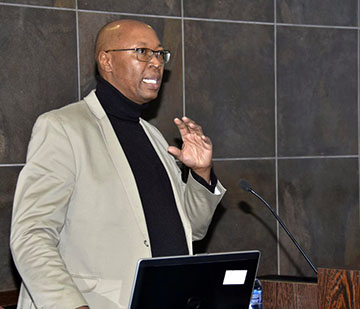
Unisa launched the Academic Development Open Virtual Hub (ADOVH) and its Innovation in Teaching and Learning Series on 15 February 2021. The event is in line with the institution’s 2016-2030 institutional strategy, with the first strategic focus area emphasising the need for accelerating the shift towards becoming a leading African open, distance, and e-learning (ODeL), comprehensive university in teaching and learning, research, innovation, and community engagement based on scholarship.
The programme director and project leader, Denzil Chetty, said ADOVH is an initiative by the Department of Higher Education and Training (DHET) University Capacity Development Grant, and specifically looks at how institutions respond during the Covid-19 crisis. “In terms of objectives, one of the critical areas to look at is how technology has shaped the higher education (HE) landscape, and, more specifically, the teaching and learning space,” added Chetty.

Prof Oupa Mashile (ED: DTSFL)
In his welcoming and introductory address, Professor Oupa Mashile, Executive Director of the Department of Tuition Support and Facilitation of Learning (DTSFL), defined academic development from the 2019 Unisa Development Framework as “encompassing integrated student-centred, targeted institutional initiatives that are aimed at enhancing the capacity of academic and support staff, as well as students, to optimise student success within an ODeL environment.” He added that the initiatives are undergirded by the principles of, among others, blended learning, infused support, and collaborative development of the curriculum.
He said the focus of the ADOVH will be on the academic development of staff and students in an open and virtual technology-mediated learning space. “This will include free open courses, open webinars, open education resources, and the establishment of a community of practice.” He affirmed that the aim is to broaden insights to the global trends in teaching and learning.
Mashile stated that the Covid-19 crisis resulted in more than 90% of the world’s student population being forced to stay at home to reduce the spread of the virus. He added that, as a way of minimising disruptions, most universities shifted to online or blended learning. This raised the question of institutional readiness to provide academics with information and communication technology (ICT) infrastructure.
He elaborated: “Many institutions that were forced to move online quickly overlooked the need to invest in tools, training, resources, assessment, student support, and overall understanding of what to anticipate in online teaching.” He further added that critical concerns of access to technology and connectivity for both students and academics became a mainstream discourse.
According to Mashile, online teaching and learning requires different types of skills, including pedagogical, technical, communication, and collaborative skills that may mismatch those that lecturers are familiar with. He reiterated that as technologies advanced during the pandemic, academics were forced to embrace new methods of teaching driven by technology, rethink their content and curriculum design, and rethink their assessment approaches.
Highlighting academic development challenges for students, he noted that with a shift to technology-mediated learning, students also require a new set of skills. He explained: “Students need to have the competency to navigate the learning environment, access and manage knowledge, and manage their own learner autonomy by managing their individual learner processes.”
Three internationally acclaimed speakers gave insightful presentations. Professor Marcus Specht of the Technical University of Delft and Director of the Leiden-Delft-Erasmus Centre for Education and Learning, spoke on Mobile and seamless learning, while Dr Andreia Inamorato dos Santos, a researcher in educational technology, spoke on Open pedagogies for a digital era. The last speaker, Dr Yishay Mor, an education, innovation, technology, design consultant focused on Hybrid education: When learning defies boundaries and challenges conventions.
*By Nancy Legodi, Acting Journalist, Department of Institutional Advancement
Publish date: 2021-02-19 00:00:00.0